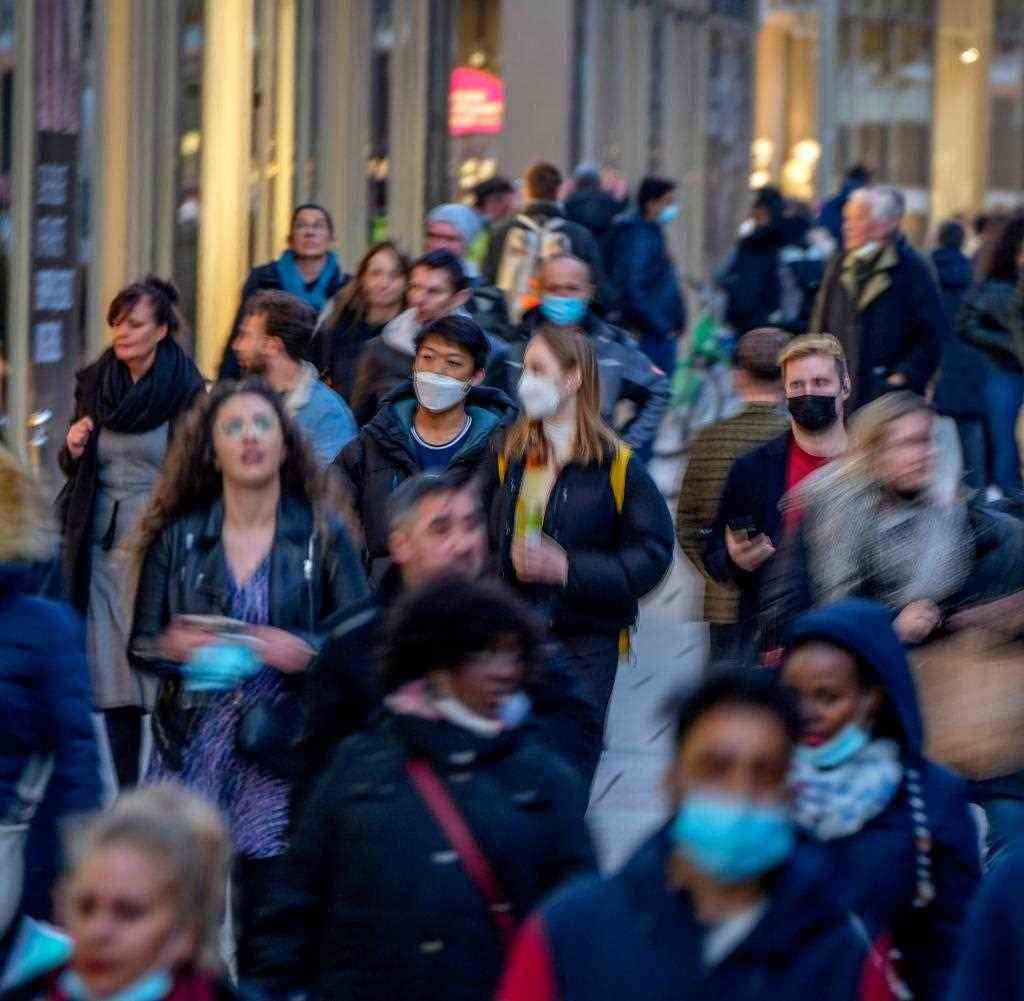D.he nationwide seven-day incidence has risen again and has peaked for the fifth day in a row. The Robert Koch Institute (RKI) stated the number of new corona infections per 100,000 inhabitants and week on Friday morning as 263.7. Since Monday there had been records in the incidences reported by the RKI on a daily basis. On Thursday the value was 249.1. A week ago the value was 169.9 (previous month: 65.8).
The health authorities in Germany reported 48,640 new corona infections to the RKI within one day. This is evident from the numbers that reflect the status of the RKI dashboard at 3:40 a.m. This is the second highest value since the beginning of the pandemic. The number of new infections had reached a record level the previous day at 50,196. Exactly one week ago the value was 37,120 infections.
According to the new information, 191 deaths were recorded throughout Germany within 24 hours. A week ago there were 154 deaths.
Vaccinated and recovered carnivalists celebrate on November 11th despite the rising incidence. close together
Source: dpa / Rolf Vennenbernd
All developments in the live ticker
5:30 a.m. – intensive care units in Bavaria massively overloaded
Because of the rapidly increasing number of infections, the intensive care units in Bavaria are massively overloaded. “We are certainly not in a triage situation where we have to decide who we should treat and who not,” said the Nuremberg intensive care doctor Stefan John, board member of the German Society for Internal Intensive Care Medicine. However, many patients would have to be relocated and sometimes could not be treated as quickly as usual. Emergency doctors often have to make long phone calls and drive long distances to find a place in an intensive care unit. At a Heart attack however, for example, any time lag could cost lives.
5:15 a.m. – Infectiologist: Many people are tired of pandemics
According to the Rostock infectiologist Emil Reisinger, the enormous increase in the number of corona infections in recent times can also be attributed to increasing pandemic fatigue among people. “The AHA rules and the wearing of protective masks are being observed less and less despite the acute threat,” he told the German press agency. It is known that the most important protection against infection after vaccination is wearing masks.
That is why the virus is particularly rampant among the unvaccinated. Also affected are people who were not vaccinated to the extent necessary. The science goes from up to ten percent of so-called vaccination failures, said the doctor. These people did not produce enough antibodies. However, it can be observed that for many of them a third spade, the so-called booster vaccination, leads to a significant increase in antibodies.
04:35 am – Emergency plan presented in Japan
The Japanese Prime Minister Fumio Kishida has presented an emergency plan to increase hospital beds and medical resources in preparation for winter. The bed capacity is to be increased by around 30 percent and home care is to be increased. “In parallel to strengthening the medical system, we will use IT systems from December to publish the number of hospital beds and the conditions in the individual hospitals,” Kishida told reporters. After a fifth wave of infections almost overwhelmed the medical system during the summer, infections and deaths in Japan have fallen dramatically, as more than 70 percent of the population are now vaccinated.
4:30 a.m. – Sharp criticism of the planned corona measures by the traffic light parties
Saxony-Anhalt’s Prime Minister Reiner Haseloff has sharply criticized the planned corona measures of the traffic light parties in the federal government. “I consider the decision to end the pandemic emergency of national scope to be a serious political mistake,” said the CDU politician to the German Press Agency in Magdeburg. “That is also a wrong decision in the matter.” The pandemic situation of national scope must be extended.
The potential government partners SPD, Greens and FDP want to let the special status expire on November 25th. The previous legal basis for corona restrictions is to be replaced by a new Infection Protection Act, which is intended to legally secure a smaller catalog of possible measures in the fight against the pandemic.
These include restrictions on the unvaccinated through 3G rules – access only for convalescent, vaccinated and tested people – or 2G rules – only for convalescent and vaccinated people. Haseloff does not believe that 2G motivates people to vaccinate: “Those who are not vaccinated now are very, very difficult to reach,” he said.
3:45 am – Seven-day incidence increases to 263.7
The Robert Koch Institute (RKI) reports 48,640 new positive tests. That is over 11,500 cases more than on Friday a week ago, when 37,120 new infections were reported. The seven-day incidence rises to 263.7 from 249.1 the previous day. The value indicates how many people per 100,000 inhabitants have been infected with the corona virus in the past seven days. 191 other people died related to the virus.
This increases the number of reported deaths to 97,389 within 24 hours. In total, more than 4.94 million corona tests have so far been positive in Germany.
03:15 am – Heil wants to coordinate the planned 3G rules in the workplace with business and trade unions
Federal Labor Minister Hubertus Heil (SPD) wants to introduce the planned 3G rules at the workplace to contain the fourth corona wave in consensus with business and trade unions. “To ensure that the 3G rules are consistently implemented in the workplace, I am looking to talk to German employers and trade unions.
We can only ensure effective protection and more vaccinations if employees, companies and the state work together, ”says the SPD politician of the Düsseldorf“ Rheinische Post ”. The measures taken so far have not been sufficient to reduce the incidence of infections. That is why it is right to maintain the requirements for operational infection protection. In addition, only those who have been vaccinated, those who have recovered and who have been tested will be allowed to go to work in the future. This is necessary because the vaccination rate is still not sufficient and the number of unvaccinated people is still high, so Heil.






